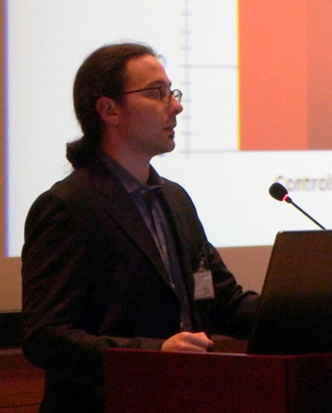
Davide Crivelli, Ph.D.
Get in touch with him:
This email address is being protected from spambots. You need JavaScript enabled to view it.
This email address is being protected from spambots. You need JavaScript enabled to view it.
Davide received his Master Degree in Developmental and Communication Psychology and 2nd-level Master Degree in Neuropsychology from the Catholic University of the Sacred Heart (UCSC). In 2013 he also took his PhD in Psychology focusing on Social Neuroscience.
He currently is Researcher in Psychobiology and Physiological Psychology (SSD M-PSI/02) at the Faculty of Psychology (UCSC), as well as member of the International Research Center for Cognitive Applied Neuroscience (IrcCAN), Faculty of Psychology, and of the Research Unit in Affective and Social Neuroscience, Department of Psychology, UCSC.
He is part of the faculty of the 2nd-level Post-Graduate Master Degree in "Behavioural Neuroscience: Prevention, Neuroempowerment, and Neurorehabilitation", he holds theoretical-practical lessons on the application of psychophysiological and neuroscience techniques for research and intervention at the UCSC Graduate Programme in Psychology for Well-being as well as a course on research methods for psychology at the UCSC Bachelor Programme in Psychological Sciences, and he is Coordinator for Professional Experiences at the Graduate Programme in Psychology for Well-being.
Once Academic Coordinator of the Executive Training Course in "Neuromanagement for Organizations", he is now member of the Managing Committee of the 1st-level Post-Graduate Master Degree in "Neuromanagement for Organizations: Neuroassessment, Neuroempowerment, and Innovation"
He gained well-established expertise in: neuropsychological assessment and rehabilitation; biosignal recording, integration, and processing (EEG, autonomic indices, eye-tracking, fNIRS, signal source localization); non-invasive brain stimulation (TMS, tES) and neuronavigation; applied psychophysiological techniques for affective-cognitive empowerment (neurofeedback, biofeedback, relaxation and mindfulness techniques); project design and methodology for basic and applied research; and quantitative-qualitative analysis.
His main research interests have to do with automatic processing of social information and physiological markers of social dynamics, with the relationship between sense of agency, self-awareness, and self-regulation, and with novel application of neuroscience tools and wearable devices for stress management and empowerment of cognitive-affective skills in applied contexts such as neurocognitive empowerment, healthy aging, peak performance, and sports.
He is member of the Editorial Staff of the international journal Neuropsychological Trends. He is also member or part of the managing committee of national and international scientific societies (AIP; AIPS; SINP; SIPI; SPAN; SfN; SPR). He is tutor for practicums associated to the 2nd-level Post-Graduate Master Degree in Behavoural Neurosciences and is regularly part of organizing committees for conferences, workshops and advanced training courses.
